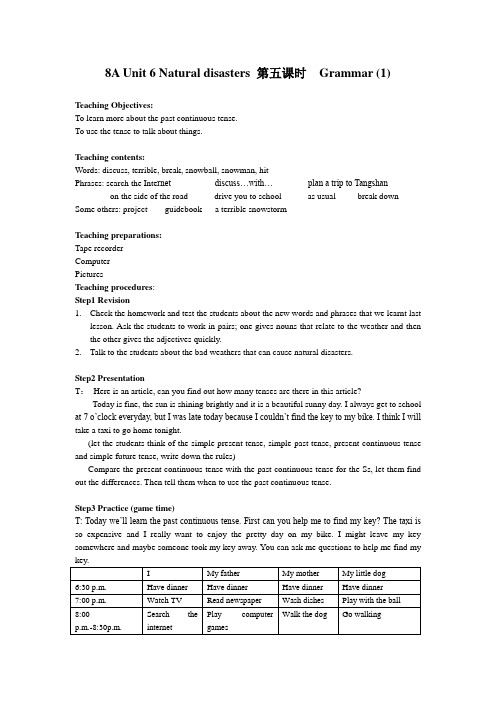8A Unit6 Natural disasters Grammar 课件
- 格式:ppt
- 大小:3.74 MB
- 文档页数:64



8A Unit 6 Natural disasters 第五课时Grammar (1)Teaching Objectives:To learn more about the past continuous tense.To use the tense to talk about things.Teaching contents:Words: discuss, terrible, break, snowball, snowman, hitPhrases: search the Inte rnet discuss…with… plan a trip to Tangshan on the side of the road drive you to school as usual break down Some others: project guidebook a terrible snowstormTeaching preparations:Tape recorderComputerPicturesTeaching procedures:Step1 Revision1.Check the homework and test the students about the new words and phrases that we learnt lastlesson. Ask the students to work in pairs; one gives nouns that relate to the weather and then the other gives the adjectives quickly.2.Talk to the students about the bad weathers that can cause natural disasters.Step2 PresentationT:Here is an article, can you find out how many tenses are there in this article?Today is fine, the sun is shining brightly and it is a beautiful sunny day. I always get to school at 7 o’clock everyday, but I was late today because I couldn’t find the key to my bike. I think I will take a taxi to go home tonight.(let the students think of the simple present tense, simple past tense, present continuous tense and simple future tense, write down the rules)Compare the present continuous tense with the past continuous tense for the Ss, let them find out the differences. Then tell them when to use the past continuous tense.Step3 Practice (game time)T: Today we’ll learn the past continuous tense. First can you help me to find my key? The taxi is so expensive and I really want to enjoy the pretty day on my bike. I might leave my key somewhere and maybe someone took my key away. You can ask me questions to help me find myT: I was having dinner at 6:30p.m. last night. What was my father doing at that time?Do it for several times with the children and then let them try to make up sentences with the information in the timetable.What was our teacher doing…?What was her father/ her mother/ her little dog doing from… to…?(let the students ask these questions to practice the past continuous tense)Then the teacher asks:Was I having a shower at 6:00p.m.?Teach them: Yes, I was. No, I wasn’t.Yes, you were. No, you weren’t.Show the students the rules again and let them work in pairs.Step 4 Practice1. Let the Ss finish the exercise on page 99 and check the answers.2. T: We know that there are a lot of natural disasters in the world this year, for example, we havea terrible earthquake and a snowstorm in China. It brought a lot of troubles to our daily lives, what were they? (snowball, snowman, break down, fall down)3. Finish the exercise on page 100 and check the answers.4. Do more exercises.5. show the differences between the simple past tense and the past continuous tense.Step 7 HomeworkFinish the Workbook exercises.。

8A Unit 6 Natural disasters 第六课时Grammar (2)Teaching Objectives:To learn more about the past continuous tense.To learn the usage of “when” and “while” in the past continuous tense.Teaching contents:Words: discuss, terrible, break, snowball, snowman, hitPhrases: search the Internet discuss…with… plan a trip to Tangshan on the side of the road drive you to school as usual break down Some others: project guidebook a terrible snowstormTeaching preparations:Tape recorderComputerPicturesTeaching procedures:Step 1 RevisionT: Can you talk to your partner about your morning? And tell them what you were doing at each time. Make a dialogue.Work in pairs and then ask some of the pairs to and act it out.Then let the students guess what I was doing this morning, using “were you…?”Do more exercises to consolidate the rules we learnt.Step 2 PresentationT: What were you doing when I came into the classroom just now?Ask some students and write down the sentences on the blackboard.I was talking to the classmates when you came in.I was reading the English book when you came in.I was cleaning my desk when you came in.T: ask two of the students to come to the front and do different actions, ask, what was A doing while B was…Write down the time and the students’ different activities on the blackboard and ask: what was A doing while B was doing something?What was B doing while A was doing something?He was playing football when the snowstorm hit LiyangThey were talking loudly when the bell rang.Our teacher was talking to Amy when I came into the office.My mother was preparing the breakfast when I got up.Compare when and while, tell the students the differences between when and while.Step 3 PracticeDo some exercises1. My wallet dropped on the ground _______ I was running.2. __________ I was falling asleep, there was a loud knock on the door.3. __________ he was reading, an earthquake started.4. Were the students listening to the teacher carefully __________ the teacher was giving a lesson?5. __________ the telephone rang, I became nervous.1.What _________you _______(do) at this time yesterday.2.He __________ (watch) TV from 8p.m. to 10p.m. I ____________(play) piano.3. John _________ (fly) kites in the park at 9a.m. yesterday morning.4. Sandy __________ (call) Daniel at that time5. He ___________ (read) while his brother _________ (watch) TV.6. They __________ (chat) when their teacher _______ (come) into the classroom.7. What__________ you___________ (do) when I knock at the door.I _____________(wash) my coats.8.________the policemen ______________(watch) the traffic or_________(have) a rest from 7 a.m. to 10a.m.?No, they ________.9. One day, he __________ (lie) on the grass and __________(look) at the sky when he fellasleep .10. I ____________ (search) the World Wide Web.11. When Simon arrived, Amy __________(read) a book.12. My mother ________________ (cook) while my father _____________(read).翻译句子.1.我妈妈正在做饭,我爸爸在看报纸.2.当老师进教室时,学生们在相互聊天.3.当孩子们正在上课的时,地震发生了.4.当我购物时,我突然听到了一声象雷一样的巨响.Step 4 PresentationDo you remember the snowstorm we learnt yesterday?What can you do if the snowstorm stops?Then show the students some pictures and teach them some new words and phrases.Ask the students to finish the exercises on page 101 then check the answers.Step 5 Homework。





